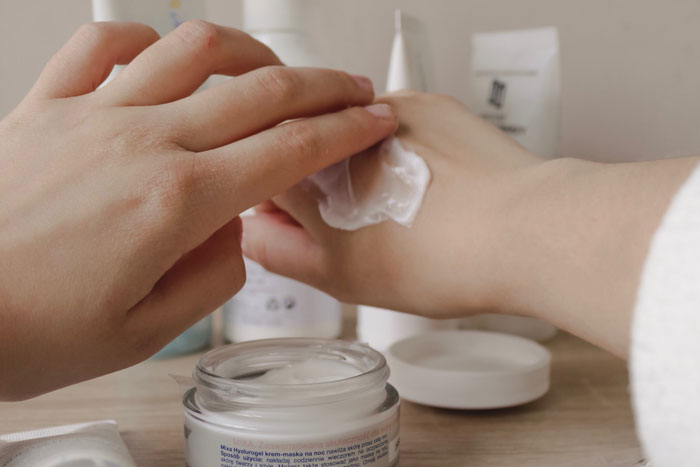 Feature Image by Anastasiia Ostapovych
Feature Image by Anastasiia Ostapovych
Clean beauty has been a pretty big deal over the last few years. You can shop anywhere from Sephora to Target and find packages labeled “paraben-free,” “sulfate-free,” or “contains no artificial fragrances.” While you may know these ingredients should be avoided, you may not know why.
So we talked to experts to get the lowdown on common harmful beauty ingredients and what they can do to your skin. The next time you go shopping for beauty products, be aware of the following ingredients.
Fragrance
Any products with “artificial fragrance” should be avoided. “Surprisingly enough, manufacturers and companies aren’t obligated to reveal what is in their fragrances, which is why, more often than not, you’ll see ‘fragrance’ or ‘parfum’ on the ingredients list when in reality, it could be allergens, irritants, endocrine disruptors or even cocktail of carcinogens,” Dr. Alain Michon, MD, medical director at Ottawa Skin Clinic, tells FabFitFun. These ingredients can cause redness, discoloration, collagen breakdown, and pre-mature aging and wrinkling.
Propolis
People with sensitive skin or those prone to allergic reactions may need to steer clear of products containing propolis. According to board-certified dermatologist, Elizabeth Geddes-Bruce, MD, propolis is a resin derived from honeybees and is often used in waxy emollients, like a lip balm. “If your chapped lips are getting worse instead of better after using a lip balm, consider an allergy to propolis,” Geddes-Bruce says. “It can leave the skin red, dry, irritated, or cracked.”
Diethanolamine
Diethanolamine (DEA), monoethanolamine (MEA), and triethanolamine (TEA) are three ethanolamine compounds commonly used in products to make them foamy or creamy. According to clean beauty expert Jessica Rose, they’re also used as pH adjusters to alter the acidity of other ingredients in product formulations. You want to avoid these ingredients because they can irritate the skin and eyes. DEA has also been found to interfere with the normal functioning of the body’s hormonal system, she says.
Aluminum
As Erin Jensen PA-C, founder of California-based The Treatment Skin Boutique, tells FabFitFun, “Aluminum is a toxic metal that can have estrogen-like effects in our systems, disrupting the healthy functioning of the endocrine system.” This is usually found in almost every personal care product, especially antiperspirant deodorants.
Parabens
Parabens, which are used as preservatives and aren’t always labeled, may contribute to hormone imbalances. If your product has water in it, Jensen says it probably has a paraben to keep it from growing bacteria. Examples include methylparaben, propylparaben, isopropyl paraben, and isobutyl paraben. “If ‘paraben’ is in the word, avoid it,” she says. It’s usually found almost everywhere including skin care products such as moisturizers and deodorants.
Polyethylene glycol
Polyethylene glycol, which is also listed as PEG, is an ingredient meant to thicken products. It’s usually found in cleansers to dissolve oil and grease. According to Jensen, this is one to avoid because it can alter and reduce the skin’s natural moisture factor.
Phthalates
These are chemicals used to increase flexibility and strength of plastics, and not often listed among the ingredients on products. Like parabens, Jensen says phthalates are endocrine disruptors and can cause hormonal and reproductive problems and birth defects. You can usually find this in cosmetics such as fragrance oils, and it’s usually listed under the term “fragrance.”
Triclosan
According to Jensen, triclosan is a synthetic antibacterial agent that can disrupt thyroid function and can degrade into a form of dioxin, which is a class of chemicals linked to cancer. This is usually found in soaps, mouthwash, shaving cream, deodorants, and toothpaste.
Oxybenzone
This well-established endocrine disruptor can be found in many skincare products that contain sunscreen, including lotions, lip balms, cleansers, fragrance, and even baby products. In general, you want to avoid endocrine disruptors because it can worsen conditions such as hormonal acne. It can also lead to irregular periods, illnesses, and cancer.
As always, consult your dermatologist with any questions regarding your skin care routine.
xx, The FabFitFun Team




